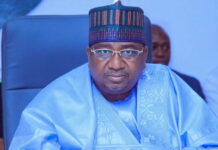Connected Development (CODE), a Non-Governmental Organisation (NGO) on Thursday said it saved the Federal Government more than N15 billion by blocking leakages in funded projects in rural communities.
Mr Hamzat Lawal, the Chief Executive Officer (CEO) of CODE made this known at a news conference to mark the group’s seventh year anniversary and to unveil the new brand of its “Follow The Money Initiative’’.
According to Lawal, Follow The Money Initiative advocates and tracks government and international aid spending in health, water, sanitation hygiene and education across grassroots communities to ensure and promote open government and service delivery.
He said that apart from saving government N15 billion in seven years of its establishment, CODE had also tracked an estimate of $113.6 million in budgeted sums for projects across 181 communities in more than 25 Nigerian states.
“We have improved more than four million lives in the rural areas, practically, we have also ensured that 5million children have gone back to school.
“When you look at the data from 2015 till date, Follow The Money was instrumental to reducing the statistics of out of school children from 15 million to 10.1 million.
“We did this by ensuring that the children go back to school with the basic education resources we tracked.
“Also in tracking basic healthcare, we have ensured that we saved over 15 million lives in various communities because today they now have access to quality primary health care centres .’’
Lawal said that grassroots communities in Nigeria were constantly deprived of access to basic human needs like healthcare, water, and education in spite of billions of naira of tax generated revenues appropriated for these projects.
According to him, most time these funds do not reach the communities so disturbed by this anomaly, CODE is providing marginalised communities in Africa with resources to amplify their voices by creating platforms for dialogue.
He said that the group build capacity of citizens and empower them to hold their elected representatives accountable through the Follow The Money Initiative,
He said that Follow The Money was now in seven countries in Africa namely: Kenya, The Gambia, Cameroun Malawi, Zimbabwe Liberia and Nigeria with Canada at the verge of joining.
Lawal said that the Economic and Financial Crimes Commission (EFCC) recently expressed readiness to partner with CODE in the fight against corruption at the grassroots and ensure that government and international funds for projects were appropriately utilised.
He said EFCC agreed to assign a desk officer for CODE to manage and ease communication with the Follow The Money chapter leads across states.
Also speaking , Ms Kevwe Oghide, Lead Communications and Advocacy, CODE said that Follow The Money recently emerged winner of the 2019 Council of Europe’s Democracy Award.
Oghide said that Nigerians suffer because of a broken system which allowed public funds to be siphoned and until public funds begin to work for the good of the people, the dividends of democracy may not be attained.
She called on the media to also help in holding government accountable and to be the voice of the people to ensure that communities get access to social amenities.
She said that Follow The Money unveiled its new corporate identity in line with its mission to track government funds and international aid funding to promote transparency and accountability in governance.
Mr Busayo Morakiyo, Community Engagement Manager, CODE said that all the chapters of CODE were in Abuja to mark its 7th year anniversary and to assess its impact since 2012.
Morakiyo said that CODE empowered youths to track projects in their various rural areas as a form of including youths in the anti-corruption fight and three persons emerged winners.
He said Mr Akinsola Jeremiah from Kwara, Ukeme Anwan from Akwa Ibom and Muhammad Kime from Yobe were the winners and were awarded N100,000 each.
The awardees commended CODE for the privilege and promised to continue to work toward tacking projects in communities to ensure that appropriations were unitised effectively. (NAN)



